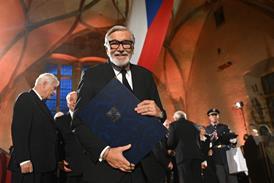Dir: Jose Luis Lopez-Linares. Spain. 2008. 87mins.
Jose Luis Lopez-Linares'nuanced documentary is at once an enjoyable satire on the modern cult of the top-flight chef and a telling human story about shattered illusions and personal growth. Following its late slot at the Berlinale - where the film managed to lift and delight the screened-out audience - and its home debut at the Festival de Malaga, the film plays in the Encounters section at Tribeca; further festival action seems assured, and despite its Spanish slant small theatrical runs in other territories with high gourmet counts are not unthinkable. If nothing else, The Chicken... looks set to be a hot international seller on the quality TV circuit.
The film is set against the background of the Bocuse d'Or a bi-annual cooking contest established by celebrity chef Paul Bocuse in 1987. Analogies with the Olympics are well-founded: chefs are chosen to represent single countries after winning their national heats; the event takes place in a sports stadium in Lyons, where noisy, flag-waving fans (some flanked by cheerleaders) spur on their teams, who do their stuff in a row of open-to-view kitchens. The rules too are as strict as in any sporting event: competing chefs, accompanied by a single assistant, have five and a half hours to come up with one meat and one fish dish, using three obligatory ingredients - which in the 2007 edition were Bresse chicken, Norwegian white halibut and Norwegian Red King crab.
Such necessary details are sensibly got out of the way at the beginning, so that the documentary can focus on its real interest: the hopes and dreams of young chef Jesus Almagro who after walking away with the Spanish cooking championships is convinced that he can help his country win the Bocuse d'Or for the first time in 2007. We're briefly reminded of what tuned-in foodies will already know: that for most of the last decade, Spain has been one of the hottest territories on the world gastronomic stage. It soon becomes clear, however, that winning the Bocuse d'Or has little to do with a country's culinary excellence (Norway has lifted the top prize three times in eleven editions, whereas contestants from great food nations like Italy, China and India have never even been placed).
Lopez-Linares' film works so well is because it combines info rmation, comedy and drama in a near seamless mix. The drama has a lot to do with Almagro's weathervane face, which registers every setback (and there are quite a few of these); the camera dwells insistently on his hissy fits, moments of quiet despondency and rare spurts of confidence as his inital dish is rejected by a panel of Spanish culinary elders and his presentation is criticised by Serge Vieira, a former French winner turned Spanish team advisor. We also meet Almagro's mother, whose home truths provides a down-to-earth foil to her son's increasingly brittle mix of ambition, self-belief and wounded pride.
The three ingredients are the excuse for wry interludes as we meet the chicken, the halibut ('a little bit a mystic fish', says one dour Norwegian fisherman) and the king crab in their natural habitats. We also hear from former Bocuse d'Or winners and the previous edition's Spanish loser, until, after an hour, we're into the finals in Lyon, and meeting Bocuse himself as he strolls proprietorally around working the room and posing for photographs - looking every inch 'the Godfather', as one interviewee refers to him.
An experienced documentary director, Lopez-Linares has a sure sense of dramatic structure - something enhanced by the fluent editing of Sergio Deustua, who plays an entertaining game with disjunctive voice and image cutting. Teo Delgado's handheld camerawork conveys the tension of the preparatory work and the adrenalin of the final event. One or two directorial flourishes - especially a sped-up, silent-comedy-style kitchen prep sequence - don't quite come off. But all is redeemed as the seconds tick by on the clock by one of the most enjoyable breaking-the-fourth-wall moments of recent cinema history.
Foodies the world over will find plenty to scarf down here; but in the end the real strength of The Chicken... is the fact that it's not so much about high-end cuisine as the humanising value of failure.
Production companies
Zebra Productions
Lopez-Li Films
International sales
Latido Films
(34) 91 5488 877
latido@latidofilms.com
Producers
Antonio Saura
Jose Luis Lopez-Linares
Screen play
Antonio Saura
Jose Luis Lopez-Linares
Cinematography
Teo Delgado
Editor
Sergio Deustua





























No comments yet